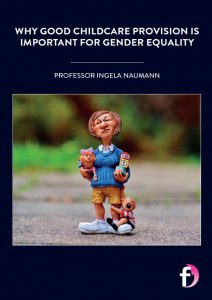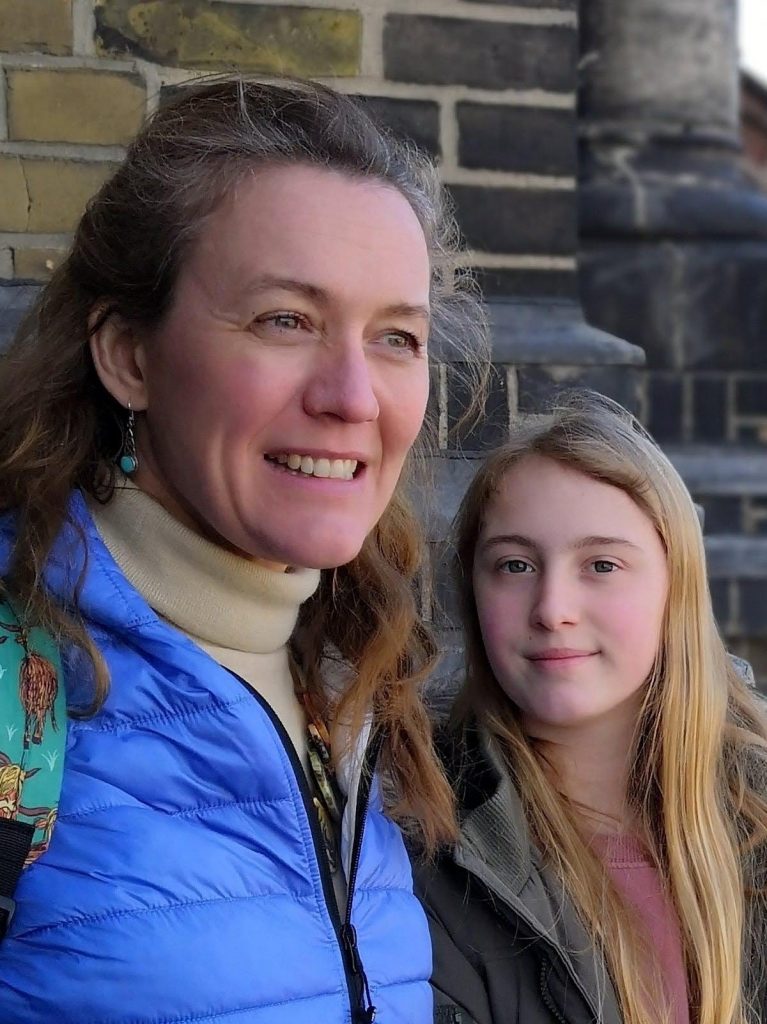Why good childcare provision is important for gender equality
The UK has some of the highest childcare costs in the world. For many families, this means it is more economical for one parent to give up work than it is to pay for full-time childcare. Usually, this will be the mother. Ingela Naumann is professor of comparative social policy at the University of Edinburgh in the UK. By investigating the gender inequalities caused by insufficient childcare provision, she hopes to influence policy changes so that women can be mothers and have successful careers at the same time
TALK LIKE A SOCIAL POLICY RESEARCHER
MATERNITY LEAVE – the time a mother takes off work after the birth of a child. In the UK, a mother is entitled to 52 weeks of maternity leave, 39 of which are paid
PATERNITY LEAVE – the time a mother’s partner takes off work after the birth of a child. In the UK, a mother’s partner is entitled to 2 weeks of paid paternity leave
SHARED PARENTAL LEAVE – the combined time both parents take off work after the birth of a child. In the UK, both parents can share 50 weeks of leave and 37 weeks of pay
GENDER NORMS – societal ideas about how different genders should behave
QUALITATIVE DATA – data describing qualities or characteristics of something
QUANTITATIVE DATA – data expressing quantities and numerical values
WHY RESEARCHING GENDER EQUALITY IS IMPORTANT
When she was seven years old, Professor Ingela Naumann’s daughter came to her, distraught. “Mum, I don’t know what to do,” she said. “I really want to be a herpetologist when I grow up, but I also want to be a mum. I don’t know which one to choose.”
This encounter had a strong impact on Ingela, a professor of social policy at the University of Edinburgh. She is interested in how government policies promote or hinder gender equality in society. “We are allegedly promoting gender equality and equal opportunities for women, and, yet, by the time they are seven, girls are already aware that society is not as equal as we like to believe,” she says. “Society makes it difficult for girls to combine their dreams of flying high with being mothers.”
Ingela’s daughter’s comment is particularly striking, given her family background. With a working mother, grandmother and great-grandmother, she had grown up surrounded by role models of women who had successful and fulfilling careers alongside raising a family. The idea that she could not be a scientist and, also, a mother had not come from within her family, so why did she think she could not be both?
Despite her family background, society’s expectations have a strong influence on Ingela’s daughter. Growing up in 21st century Scotland, she is exposed to cultural and societal norms that teach her that women must make a choice: to have a career or to be a mother. Ingela is determined to influence policy and society so that girls no longer believe this.
WHY GOOD CHILDCARE PROVISION IS IMPORTANT FOR GENDER EQUALITY
In the UK, gender norms and insufficient childcare provision are key barriers to gender equality in the workplace. “It is all very well to say that women and men have equal rights in the labour market,” says Ingela, “but what should parents do with their babies while they work?”
Traditional gender roles are still ingrained in UK society when it comes to the responsibility of raising a family. A mother is much more likely to give up work to care for children than a father is. Indeed, it was only in 2015 that the law changed to allow both parents (including same-sex parents) to share parental leave after a baby is born. Prior to that, only mothers were entitled to 52 weeks of maternity leave after giving birth, while their partner had to return to work after only two weeks of paternity leave. Once parents return to work, they must come up with their own childcare solution, either by finding a childcare place with a nursery or childminder, or by involving grandparents, wider family and friends.
This situation is not the same everywhere. Nordic countries, in particular, offer extensive support for parents to combine work and care responsibilities. In Sweden, for example, shared parental leave has been a reality since the 1970s. It is 18 months long and includes generous income replacements for most of this time. In addition, all children over the age of one are entitled to full-day, year-round childcare if their parents are working. While this childcare is not free, it is heavily subsidised so is affordable to parents, allowing more than 85% of Swedish mothers to work, with 71% pursuing full-time employment. Fathers claim a third of all paid parental leave in Sweden, as they are also expected to take time off to care for their children.
In England, all children are entitled to 15 hours of free early education per week during termtime, from the time they turn three until they start school. This entitlement is extended to 30 hours per week for children of working parents. In Scotland, all three- and four-year-olds are entitled to 30 hours of free nursery education, whether their parents are working or not. While this is one of the most generous provisions of early childhood education in the world, it does not solve the problem of what happens to a child between the age of one, when parental leave ends, and the age of three, when free nursery begins. Nor does the free nursery entitlement support parents who work full-time, as the timing (usually 9am to 3pm) is incompatible with the hours of most jobs, and school holidays are not covered. So, who will care for the children when their parents are working?
THE COST OF CHILDCARE
With little public childcare available in the UK for children aged one to three, and additional childcare needed in the mornings, afternoons and holidays for children aged three and up, parents are forced to pay for private childcare. This can cost over £1,000 per month. “The UK has some of the highest childcare costs in the world!” says Ingela. “For many families, it is impossible to balance the high cost of childcare with their income.” It is often more economical for one parent to reduce their working hours, or give up work completely, than it is to pay for full-time childcare. “Unfortunately, this is usually the mother.”
The gaps in current childcare policy mean that families often slip into traditional gender roles, where women care for the children and men focus on providing for the family. This perpetuates gender inequalities – it creates barriers for mothers to have a successful working life and financial independence, and it creates barriers for fathers to be fully involved in caring for their children.
Ingela works closely with policymakers in the Scottish Government as she investigates the gender inequalities that result from a lack of affordable childcare services. In her research, she examines and compares social policies across different countries to better understand which policies best support equal parenting and gender equality in the labour market. She uses this method of evidence-based policy learning to advise the government on how policies should be changed to create better conditions for gender equality in the UK.
HOW DID COVID-19 IMPACT FAMILY WELL-BEING?
In March 2020, as COVID-19 hit the UK, a national lockdown was enforced. Schools and childcare facilities were closed, leaving parents to juggle the responsibilities of home-schooling, childcare, domestic chores and work, all while isolated within their family bubble. “The situation provided us with a bleak real-life experiment to explore the question ‘What happens if childcare infrastructure is removed?’” explains Ingela. She collaborated with various non-academic partners, including the Scottish Government, One Parent Family Scotland and Child Poverty Action Group, to investigate the impacts of lockdown on family well-being.
Ingela and her research team conducted qualitative interviews with families throughout Scotland, covering a range of different family situations. These included single-parent families, families containing keyworkers, dual-earner families, families with underlying health conditions and families from both urban and rural areas.
The interviews gave detailed insights into the experiences of families and the challenges they faced during the pandemic. The team also analysed quantitative data from large-scale UK surveys to understand general health and well-being trends in families during the pandemic. This research generated rich evidence on the way the pandemic affected children and their parents. “On a positive note, we found that families were amazingly resilient,” says Ingela. “Parents worked incredibly hard to protect their families, to keep life going.” However, this came at a cost. Ingela’s research revealed that the mental and emotional well-being of both children and parents suffered during lockdowns.
Reference
https://doi.org/10.33424/FUTURUM321
“We have robust evidence showing that mothers were particularly impacted by the mental strain of lockdown, and especially mothers with two or more children,” says Ingela. The research shows that looking after the family, including home-schooling, domestic chores and caring for children, was predominantly done by women. At the same time, many of these mothers were also trying to work from home. Ingela’s results show this had a strong impact on women’s mental health. “We have a strong message coming out from this research,” she says. “Women have borne the brunt of this pandemic.”
CHANGING POLICY AND SOCIETY
The Scottish Government has pledged to expand childcare provision before and after the school day and during holidays and has invited Ingela to share her expertise and advice on the development of its new childcare policy. Ingela’s research into childcare and family well-being will contribute to national policy changes that hopefully lead to societal shifts in gender norms.
“It is important to point out that this isn’t an issue for women to solve, but for society as a whole,” explains Ingela. We need a society where fathers can be fully involved in the care of their children. And we need the next generation of young women to grow up knowing they can have a successful career while also being a mother, and that they can truly be whatever they want to be.
 PROFESSOR INGELA NAUMANN
PROFESSOR INGELA NAUMANN
School of Social and Political Science, University of Edinburgh, UK
FIELD OF RESEARCH: Social Policy
RESEARCH PROJECT: Investigating the importance of childcare services for gender equality and examining family well-being during COVID-19
FUNDER: Economic and Social Research Council (ESRC)
ABOUT SOCIAL POLICY
“As social policy researchers, we want to understand social problems in society, find solutions to these issues and improve the well-being of people,” says Ingela. She enjoys working in this applied field as she can use her research to influence policy change in areas she is passionate about.
WHAT DO SOCIAL POLICY RESEARCHERS DO?
Social policy researchers at universities engage in research, often in collaboration with researchers in other universities and countries, and teach students, which Ingela sees as a very important and fulfilling aspect of her job. “To be able to support young people in developing their knowledge and critical thinking, so they are equipped to tackle the multiple challenges of today’s society, is a privilege,” she says. Social policy researchers also interact with governments and other stakeholders by communicating their research findings with them and working together to develop innovative solutions to societal problems.
WHAT DOES SOCIAL POLICY INVOLVE?
“Social policy is a theoretically-informed and empirically-driven field,” says Ingela. Social policy researchers do not just use social theories to study society, they also conduct rigorous and methodological data-driven analyses. This requires a multidisciplinary approach, drawing on knowledge and techniques from sociology, politics, economics, statistics, history, social work and the arts to develop an understanding of current social problems. “In social policy, you will gain key skills such as the ability to critically analyse and reflect on current complex problems, and how to effectively communicate your research to others.”
“The field covers all current social problems and issues,” explains Ingela, “be it social inequality and poverty, unemployment, education, pensions and care for ageing populations, health, housing, gender equality, the impact of climate change on social well-being, and many, many more.” This means your options are wide open as a social policy researcher.
What societal issues are you passionate about? With a career in social policy, you could explore and address these issues and contribute to new policies that improve the lives of everyone.
EXPLORE CAREERS IN SOCIAL POLICY
• Social policy researchers are not only found in universities, they also work in governments, as civil servants, for public institutions and for charities.
• The UK Social Policy Association has a wealth of information about the huge range of research conducted in the field, and how and where you can study social policy: www.social-policy.org.uk
• Prospects provides information about careers in social policy, including what jobs you might find yourself working in and the skills you can expect to develop: www.prospects.ac.uk/careers-advice/what-can-i-do-with-my-degree/social-policy
• The Complete University Guide provides information about the topics you will likely study during a social policy degree and the salary you can expect when you graduate: www.thecompleteuniversityguide.co.uk/subject-guide/social-policy
PATHWAY FROM SCHOOL TO SOCIAL POLICY
• “You can approach social policy from almost any discipline,” says Ingela. “You don’t have to follow any set pathway.”
• At school, all your subjects will prove useful for a career in social policy. Maths and statistics skills will help you analyse data, while language skills will help you evaluate policies and communicate your ideas.
• In the UK, some universities offer undergraduate and postgraduate degrees in social policy or public policy.
• A degree in sociology, politics, human geography, history or economics could also lead to a career in social policy.
HOW DID INGELA BECOME A SOCIAL POLICY RESEARCHER?
I study social policy because I want to make a difference in the world. From a young age, I was politically active and wanted to change the world to make it a more equal place. My journey led me to become a social policy researcher, as this enables me to make an impact on society by sharing my knowledge with students, policymakers and the public.
I grew up in Switzerland with a Swedish mother and a German father. My Swedish heritage strongly shaped my identity as a girl and young woman. I grew up as the third generation of working women (my grandmother was a midwife who skied across Northern Sweden to deliver babies), so I knew that when I was older, I would work, whether I had children or not. This is the cultural norm for women in Sweden, so it was in my DNA.
But Swiss culture in the 80s and 90s contrasted with the values I had learnt from my mother and grandmother. Beyond my family, I was surrounded by a more ‘traditional’ society, where girls were expected to grow up, marry, have children and stop working.
So, in my teens, I started to engage with feminist politics. My international background made me aware of the cultural differences between countries when it comes to gender norms and triggered my interest in studying different societies. I left Switzerland and began my academic journey, studying social and political science, history and gender studies around the world, in Berlin, New York, Amsterdam, Florence…
I chose Comparative Social Policy as my research field because it allows me to better understand not only why different countries have different attitudes to gender, work and childcare, but also what concrete policy solutions can improve gender equality.
When I became a social policy lecturer at the University of Edinburgh, I experienced first-hand, as a mother of two young children, how difficult it was to combine a career with care responsibilities in the UK. I began to use my expertise in international social policy to engage with the government and other stakeholders to influence policy changes towards better childcare provision.
For me, researching and teaching social policy is a way to work towards a more equal society. I want to influence childcare policy changes at a national level, so that women no longer feel they must choose between a career or having children, and so that men can be fully involved in caring for their children.
My vision is for a world where all children, regardless of gender, can follow their dreams and reach for the sky.
Do you have a question for Ingela?
Write it in the comments box below and Ingela will get back to you. (Remember, researchers are very busy people, so you may have to wait a few days.)













